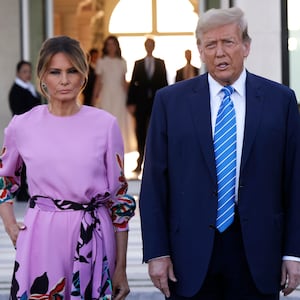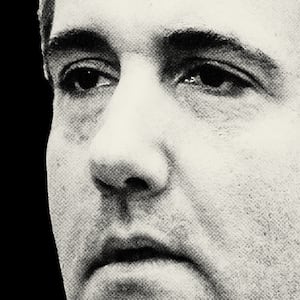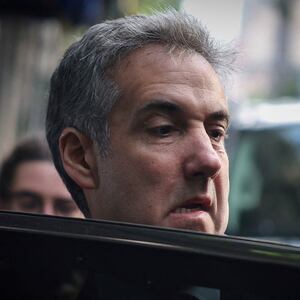The loud, combative, and boisterous Michael Cohen ditched his usual bravado and showed up to the witness stand on Monday as a somber man reflecting on the disaster that was his time working for Donald Trump.
The disgraced lawyer who lost his professional license and spent months in a federal prison to protect his former boss came ready to turn on him in court, for the first time publicly answering questions from the Manhattan District Attorney’s Office.
Wearing a dark gray suit over his white shirt and pastel pink tie, Cohen made his way into the courtroom at 9:40 a.m. with a startled look on his face, like a deer in headlights as the entire room turned its attention to the star witness at the first criminal trial against a former president in American history.
The 57-year-old ditched the foul-mouthed and unrestrained approach he takes on his podcasts and media appearances, instead appearing humbled by the moment he’s previously told The Daily Beast he’s been looking forward to for years. He stood unevenly as he raised his right hand and was sworn in to provide testimony.
“Yes, ma'am,” he said with a shaky voice.
Susan Hoffinger, the chief of the DA’s investigations division, immediately had Cohen detail the way he went from being a nondescript corporate lawyer investing in New York City’s notoriously grimy taxi industry in the 1990s to finding himself working for Trump in 2007. It was a decade-long tenure that he still looks back on fondly.
“It was fantastic working for him, especially during those 10 years. It was an amazing experience in many, many ways. There were great times, There were several less than great times, but for the most part I enjoyed the responsibilities that was given to me,” he said.

Michael Cohen, former President Donald Trump's ex-attorney, arrives at his home after leaving Manhattan Criminal Court in New York City.
Michael M Santiago/Getty ImagesYet, he readily admitted the responsibilities as the real estate tycoon’s “fixer” included dirty work.
“Did you bully people for him?” Hoffinger asked.
“Yes… in order to accomplish the task. The only thing on my mind was to accomplish the task, to make him happy.”
That extended to a key part of his portfolio: trying to scare journalists who tried to hold Trump accountable for his misbehavior as a ruthless real estate mogul and later as a politician.
“I would reach out to the press, and I would express to them either their need to redact or take the article down, or we would file an action against them,” he said.
“Did you do it in a strong and threatening manner at times?” Hoffinger questioned.
“I would say so. Not all the time, but often,” he confessed.
As long as Trump emerged victorious, Cohen felt his job was done well. On the stand, he recalled one of the first deals he worked on for the man, when the now-defunct and infamously scammy Trump University ran out of money to pay vendors and had to split $2 million that would only cover roughly 20 percent of each bill. Hoffinger asked how it made him feel.
“Like I was on top of the world,” Cohen said.
It took a little over half an hour for the prosecutor to turn the conversation over to Cohen’s private conversations with the conservative former media executive David Pecker, who would routinely use his National Enquirer publication to come to Trump’s rescue.
The 18 New Yorkers serving on this jury are all too familiar with the way the supermarket tabloid protected Trump by paying $150,000 to buy the silence of former Playboy Playmate Karen McDougal about her sexual affair with Trump, having already seen the many text messages, emails, contracts, and even heard from some of the players involved. But prosecutors used Cohen’s appearance in court to finally explain what happened on Trump’s end of the deal.
Cohen described how he routinely updated his boss on how the talks were going, getting periodic approval, and doing whatever he could to protect his boss—always with the Trump Organization’s then-chief financial officer Allen Weisselberg looped in to approve the dollar signs.
For hours, prosecutors matched verified paperwork to Cohen’s recounting of his covert catch-and-kill operation. When Cohen said his calls to Pecker kept dropping, TV screens in the courtroom showed screenshots of the encrypted phone app Signal’s logs. When Cohen recalled talking to Weisselberg, screens showed AT&T call records. When Cohen distinctly remembered checking in one last time with Trump on a Wednesday morning before heading to the bank, phone entries show two calls at 8:30 a.m.
Jurors began to see the full story coming together, one that might survive any ad hominem attacks against Cohen for being a convicted perjurer.
But it was a tiring exercise for Cohen, who by mid-afternoon looked like he’d had enough of reading the damning messages that would forever tie his fate to the former president. He donned his thin-framed glasses every time he read the computer screen in front of him, with the glasses hanging low on the bridge of his nose.

Former US President Donald Trump speaks to the press at the end of Monday’s trial proceedings.
Steven Hirsch/POOL/AFP via Getty ImagesBut jurors always perked up—with three consistently taking notes—anytime they heard about Trump’s alleged directives.
“Fantastic. Great job,” he recalled hearing from Trump when the McDougal deal went through.
“Pay with cash,” Trump instructed Cohen to repay Pecker, the former president’s voice booming through speakers in the courtroom that played an audio tape surreptitiously recorded by Cohen at the mogul’s office in Trump Tower.
“Just take care of it!” Trump allegedly told him when faced with a second scandal, this time from porn star Stormy Daniels seeking her own hush money deal for $130,000.
On the whole, the one-time consigliere to a businessman with a mob-like reputation had little new to say under oath. After all, he’s recounted his role in the scandal dozens of times in his two books, own podcast, innumerable TV shows, and now on TikTok too.
Instead, what was new was the delivery, with jurors subjected to the whole story all at once in a single macrodose of Michael. And in this format, one theme stood out above all the rest: The idea that Trump’s own greed set this entire debacle into motion.
It was Trump’s refusal to repay Pecker $150,000 that dissuaded the media executive from silencing the porn star when the second woman appeared demanding hush money.
It was Trump’s obsession with his self-proclaimed art of the deal that guided what Cohen described as his secret “strategy” to try holding off on paying Stormy Daniels until after the 2016 election to render her sex affair allegation worthless—which, in turn, put Cohen in the awkward position of having to front the $130,000 himself.
And it was Trump’s Christmastime stinginess that cut Cohen’s annual bonus by two-thirds, enraging the attorney and causing him to demand immediate repayment padded up for good measure—setting into motion the very falsified business records now at the center of the 34 felony charges the Manhattan DA is levying against Trump.
"Angry. Beyond angry. Cut my bonus by two-thirds,” Cohen remembered on the stand. “I was truly insulted. Personally hurt. Didn't understand it. Made no sense. After all that I had gone through in terms of the campaign, as well as things the Trump Organization had laid out. $130,000 on his behalf to protect him. It was insulting that the gratitude shown back to me was to cut a bonus by two-thirds.”
Cohen told the jury he went straight to Weisselberg and cussed out the old man.
“In some uncolorful language, expressed to him how truly pissed off and angry I really was. This makes no sense at all. Quite a few expletives,” he said.
Cohen became particularly somber as he told jurors he even approached Pecker, who had also been screwed by the real estate tycoon.
"I couldn't believe it. It was…” Cohen began, briefly staring into nothingness as he brought his shaking head down.
“It wasn't so much about the number as it was about… sort of the disrespect that came with it. And I was just personally insulted,” he said.
It was something of a deathblow for a man who, on the stand, readily admitted that he fully expected Trump to recommend him as a finalist for White House chief-of-staff—despite having zero credentials in national politics, any experience managing an office, or even the most remote knowledge of national security matters.
“I would’ve liked to have been considered... it was solely for my ego,” he said. “It was more about my ego than anything.”
Instead, the guy who’d made a name for himself by dabbling in New York’s sleazy tax medallion business and practicing in real estate was given the pretentious title of “personal attorney to the United States of America,” which he quickly slapped onto his email signature.
Cohen’s true nature was on full display during the final hour of his testimony on Monday, when he wistfully recalled his plans to “monetize” his role as Trump’s personal lawyer—not demanding a dime from a cheapskate who wouldn’t have paid anyway, and instead bilking consulting fees from wealthy companies seeking to influence the incoming American president.
“I knew he'd given me this title, this title which I wanted. I knew there would be no compensation,” he testified, explaining that he’d still make a living “by monetizing the role as personal attorney and creating consulting agreement relationships.”
As he had alluded to earlier in the day, Cohen knew that his 10 years serving alongside the ruthless real estate baron meant that he knew him better than anyone. And that meant the nation’s most powerful lobbyists would pay top dollar to better understand the man who’d just been elected—especially when it was still unclear what his political stance would be on most issues.
That is, on top of the $420,000 Trump repaid him for the hush money deal and other activities that were only vaguely alluded to in court.
Cohen’s recollection of what Trump said when he allegedly approved the repayment plan sounded as foreboding as it was prophetic.
“This is gonna be one heck of a ride in DC.”









